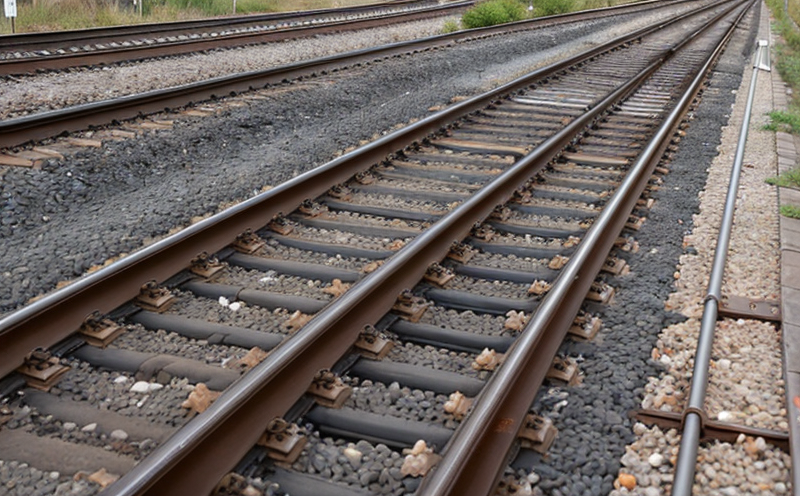Test for Electrochemical Corrosion in Railway Tracks
The Crucial Role of Test for Electrochemical Corrosion in Railway Tracks Ensuring Safety and Reliability
As the backbone of modern transportation systems, railway tracks require meticulous maintenance to ensure smooth operations, safety, and optimal performance. Among various laboratory services essential for railway track upkeep, Test for Electrochemical Corrosion in Railway Tracks stands out as a vital tool for businesses seeking to mitigate risks associated with infrastructure deterioration.
In this article, we will delve into the world of electrochemical corrosion testing, highlighting its significance, benefits, and applications within the railway industry. Our company, Eurolab, is committed to providing accurate, reliable, and comprehensive laboratory services that cater to the needs of railway operators, maintenance teams, and asset management professionals.
What is Test for Electrochemical Corrosion in Railway Tracks?
Electrochemical corrosion testing involves measuring the electrochemical behavior of metals under various environmental conditions. This non-destructive test helps assess the susceptibility of metal alloys used in railway tracks to corrosion caused by electrolytic reactions between different metals or their interaction with moisture and other substances present on or near the track surface.
Why is Test for Electrochemical Corrosion in Railway Tracks essential?
Railway operators face numerous challenges when maintaining their infrastructure, including aging assets, increased passenger demand, and exposure to harsh environmental conditions. Here are some reasons why Test for Electrochemical Corrosion in Railway Tracks should be a top priority
Prevents Unexpected Downtime Regular electrochemical corrosion testing helps identify potential risks before they escalate into costly repairs or even derailments.
Extends Asset Life By monitoring and addressing corrosion-related issues, businesses can significantly prolong the lifespan of their railway tracks.
Enhances Safety Accurate assessment of corrosion enables maintenance teams to address vulnerabilities proactively, ensuring a safer operating environment for passengers and employees.
Meets Regulatory Requirements Many countries have established guidelines or regulations governing railway infrastructure inspection and maintenance. Test for Electrochemical Corrosion in Railway Tracks helps companies comply with these standards.
Advantages of Using Test for Electrochemical Corrosion in Railway Tracks
Our laboratory service offers numerous benefits to businesses, including
Early Detection and Prevention Identify potential corrosion hotspots before they cause damage or compromise track integrity.
Data-Driven Maintenance Planning Accurate electrochemical corrosion testing enables informed decision-making for maintenance scheduling, resource allocation, and budgeting.
Improved Asset Management Comprehensive test results provide valuable insights into the condition of metal alloys used in railway tracks, allowing operators to make data-driven decisions about replacement or refurbishment needs.
Key Benefits of Test for Electrochemical Corrosion in Railway Tracks
Here are some key benefits that businesses can expect from our laboratory service
Cost Savings Regular electrochemical corrosion testing helps prevent costly repairs and reduces the financial burden associated with unexpected downtime.
Enhanced Asset Performance By identifying potential corrosion-related issues, operators can optimize track maintenance schedules to ensure optimal performance and efficiency.
Improved Safety Records Accurate assessment of corrosion vulnerabilities enables companies to prioritize high-risk areas, reducing the likelihood of accidents or incidents.
Frequently Asked Questions (FAQs)
Below are some common questions that weve addressed for your convenience
Q What types of metal alloys can be tested using Test for Electrochemical Corrosion in Railway Tracks?
A Our laboratory service supports a wide range of metal alloys commonly used in railway tracks, including but not limited to carbon steel, stainless steel, and aluminum.
Q How do I prepare my samples for testing?
A Simply collect representative samples from the area of interest, ensuring they are clean and free from contaminants. Contact us for detailed preparation instructions or any specific requirements.
Q What kind of results can I expect from Test for Electrochemical Corrosion in Railway Tracks?
A We provide comprehensive reports detailing electrochemical corrosion measurements, including polarization curves, potentiodynamic scans, and electrochemical impedance spectroscopy (EIS) data. Our expert analysts will interpret the results to provide actionable insights.
Q Can Test for Electrochemical Corrosion in Railway Tracks be performed on-site or in-house?
A While our laboratory is equipped with state-of-the-art facilities, we also offer on-site testing and sampling services for your convenience. Contact us to discuss your specific needs and requirements.
Conclusion
Test for Electrochemical Corrosion in Railway Tracks is an essential laboratory service that helps businesses maintain their infrastructure, ensuring safety, reliability, and compliance with regulatory requirements. By leveraging our comprehensive laboratory capabilities and expert analysis, operators can make informed decisions about track maintenance, replacement, or refurbishment. Contact us today to learn more about how Eurolabs Test for Electrochemical Corrosion in Railway Tracks can benefit your business.
At Eurolab, were committed to providing accurate, reliable, and comprehensive laboratory services that cater to the needs of railway operators, maintenance teams, and asset management professionals.




